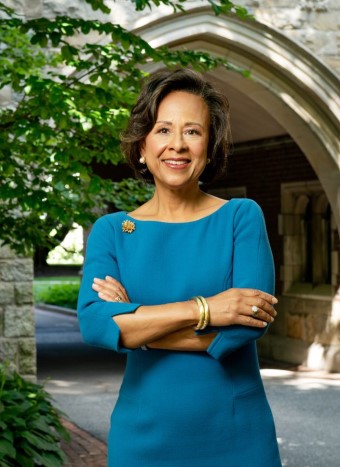
As trees burst green around Lake Waban, as buds turned to flowers, another kind of Wellesley beauty moved through Boston. During the month of April—National Poetry Month—Wellesley embarked on a unique collaboration with the MBTA and Mass Poetry. In one car of each of Boston’s four subway lines—red, orange, blue, and green—riders looked up to see poems by members of the Wellesley community.
I can’t help but see a metaphor here. Far from being in an ivory tower, locked off from the larger world, we at Wellesley strive to make a difference far more broadly—to enter into the concerns of our fellow citizens, whether they be next door or around the globe.
And that’s not all. Poetry on the T also speaks to our beliefs about whose voices matter and whom art is for. Poetry is not an elite art form that requires special knowledge. It is inclusive, welcoming, and democratic.
This was the message of last year’s commencement speaker, U.S. Poet Laureate Tracy K. Smith—and it’s the same spirit that animates what I’ve come to see as Wellesley’s poetry renaissance.
“Poetry is an equal-opportunity art form,” says Sara Lucas ’22, who, with Lulu Al Saud ’21, co-edits poetry for the Wellesley Review and played a key role in organizing Wellesley’s National Poetry Month events. “It’s a tool for anyone to put forth their story.”
“Poetry helps you understand yourself and also understand and celebrate other people’s voices,” Al Saud adds.
Wellesley is rich in respected and renowned poets. You probably recall our recent excitement when Frank Bidart—Andrew W. Mellon Professor in the Humanities and professor of English—won both the Pulitzer Prize and the National Book Award for poetry. Dan Chiasson, Lorraine C. Wang Professor of English, is the New Yorker’s poetry critic, as well as a celebrated poet himself. Spanish professor and writer Marjorie Agosín authored one of my favorite poems, “Marta Alvarado, History Professor,” a work that I was honored to read aloud at a Mass Poetry event.
And this is just the tip of our poetry iceberg. Each year, I host a dinner for faculty who have published books—and each year, I’m struck by the number of poetry collections, and not just by those in the humanities. Boundary crossers include Mala Radhakrishnan, Whitehead Associate Professor of Critical Thought and associate professor of chemistry, who uses storytelling and verse to make her subject more accessible. MBTA riders encountered poems from a broad swath of the Wellesley community: from students, alumnae, and staff, as well as faculty.
Throughout National Poetry Month, this range was reflected in our campus activities, capped by a daylong community celebration co-organized by Dan Chiasson and Suzanne Langridge, director of the Paulson Ecology of Place Initiative. Events included pop-up poetry, a performance by Wellesley Out Loud, our award-winning spoken-word organization, and readings by Sumita Chakraborty ’08 and several other visiting poets. A Student Day of Poetry spearheaded by Mass Poetry drew 225 local middle and high school students to campus from Boston and beyond.
The electric charge around poetry at Wellesley reflects an explosion of interest in the larger culture. Last year, the National Endowment for the Arts reported that nearly 12 percent of adults—28 million people—had read poetry in the past year, the highest number on record in the survey’s 15-year history.
One often-cited reason for this surge is the rise of social media as a medium for sharing. Doors once secured by gatekeepers have been thrown open. We are hearing from young poets from diverse communities. Once-marginalized voices are gaining audience share.
We are the better for this. Just as the T connects far-flung neighborhoods, so poetry has the potential to connect us with each other. It goes to the essence of what it means to be human and embodied. In a time of information overload, it asks us what matters. In a time of rapid change, it asks us what endures.
Such questions are at the heart of liberal arts education—and explain why poetry is at the heart of what we do at Wellesley.
Hear Wellesley poets read their contributions to Poetry on the T on this playlist: https://www.wellesley.edu/poetryonthet. For more on campus activities for National Poetry Month, see page 7.




We ask that those who engage in Wellesley magazine's online community act with honesty, integrity, and respect. (Remember the honor code, alums?) We reserve the right to remove comments by impersonators or comments that are not civil and relevant to the subject at hand. By posting here, you are permitting Wellesley magazine to edit and republish your comment in all media. Please remember that all posts are public.